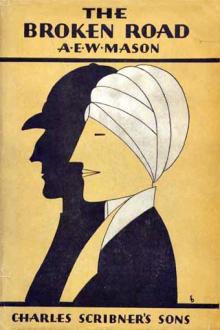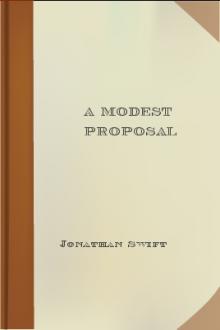The Devil's Dictionary by Ambrose Bierce (good novels to read in english TXT) 📗

- Author: Ambrose Bierce
Book online «The Devil's Dictionary by Ambrose Bierce (good novels to read in english TXT) 📗». Author Ambrose Bierce
G.J.
FIB, n. A lie that has not cut its teeth. An habitual liar's nearest approach to truth: the perigee of his eccentric orbit.
When David said: "All men are liars," Dave, Himself a liar, fibbed like any thief. Perhaps he thought to weaken disbelief By proof that even himself was not a slave To Truth; though I suspect the aged knave Had been of all her servitors the chief Had he but known a fig's reluctant leaf Is more than e'er she wore on land or wave. No, David served not Naked Truth when he Struck that sledge-hammer blow at all his race; Nor did he hit the nail upon the head: For reason shows that it could never be, And the facts contradict him to his face. Men are not liars all, for some are dead.Bartle Quinker
FICKLENESS, n. The iterated satiety of an enterprising affection.
FIDDLE, n. An instrument to tickle human ears by friction of a horse's tail on the entrails of a cat.
To Rome said Nero: "If to smoke you turn I shall not cease to fiddle while you burn." To Nero Rome replied: "Pray do your worst, 'Tis my excuse that you were fiddling first."Orm Pludge
FIDELITY, n. A virtue peculiar to those who are about to be betrayed.
FINANCE, n. The art or science of managing revenues and resources for the best advantage of the manager. The pronunciation of this word with the i long and the accent on the first syllable is one of America's most precious discoveries and possessions.
FLAG, n. A colored rag borne above troops and hoisted on forts and ships. It appears to serve the same purpose as certain signs that one sees on vacant lots in London—"Rubbish may be shot here."
FLESH, n. The Second Person of the secular Trinity.
FLOP, v. Suddenly to change one's opinions and go over to another party. The most notable flop on record was that of Saul of Tarsus, who has been severely criticised as a turn-coat by some of our partisan journals.
FLY-SPECK, n. The prototype of punctuation. It is observed by Garvinus that the systems of punctuation in use by the various literary nations depended originally upon the social habits and general diet of the flies infesting the several countries. These creatures, which have always been distinguished for a neighborly and companionable familiarity with authors, liberally or niggardly embellish the manuscripts in process of growth under the pen, according to their bodily habit, bringing out the sense of the work by a species of interpretation superior to, and independent of, the writer's powers. The "old masters" of literature—that is to say, the early writers whose work is so esteemed by later scribes and critics in the same language—never punctuated at all, but worked right along free-handed, without that abruption of the thought which comes from the use of points. (We observe the same thing in children to-day, whose usage in this particular is a striking and beautiful instance of the law that the infancy of individuals reproduces the methods and stages of development characterizing the infancy of races.) In the work of these primitive scribes all the punctuation is found, by the modern investigator with his optical instruments and chemical tests, to have been inserted by the writers' ingenious and serviceable collaborator, the common house-fly—Musca maledicta. In transcribing these ancient MSS, for the purpose of either making the work their own or preserving what they naturally regard as divine revelations, later writers reverently and accurately copy whatever marks they find upon the papyrus or parchment, to the unspeakable enhancement of the lucidity of the thought and value of the work. Writers contemporary with the copyists naturally avail themselves of the obvious advantages of these marks in their own work, and with such assistance as the flies of their own household may be willing to grant, frequently rival and sometimes surpass the older compositions, in respect at least of punctuation, which is no small glory. Fully to understand the important services that flies perform to literature it is only necessary to lay a page of some popular novelist alongside a saucer of cream-and-molasses in a sunny room and observe "how the wit brightens and the style refines" in accurate proportion to the duration of exposure.
FOLLY, n. That "gift and faculty divine" whose creative and controlling energy inspires Man's mind, guides his actions and adorns his life.
Folly! although Erasmus praised thee once In a thick volume, and all authors known, If not thy glory yet thy power have shown, Deign to take homage from thy son who hunts Through all thy maze his brothers, fool and dunce, To mend their lives and to sustain his own, However feebly be his arrows thrown, Howe'er each hide the flying weapons blunts. All-Father Folly! be it mine to raise, With lusty lung, here on his western strand With all thine offspring thronged from every land, Thyself inspiring me, the song of praise. And if too weak, I'll hire, to help me bawl, Dick Watson Gilder, gravest of us all.Aramis Loto Frope
FOOL, n. A person who pervades the domain of intellectual speculation and diffuses himself through the channels of moral activity. He is omnific, omniform, omnipercipient, omniscient, omnipotent. He it was who invented letters, printing, the railroad, the steamboat, the telegraph, the platitude and the circle of the sciences. He created patriotism and taught the nations war—founded theology, philosophy, law, medicine and Chicago. He established monarchical and republican government. He is from everlasting to everlasting—such as creation's dawn beheld he fooleth now. In the morning of time he sang upon primitive hills, and in the noonday of existence headed the procession of being. His grandmotherly hand was warmly tucked-in the set sun of civilization, and in the twilight he prepares Man's evening meal of milk-and-morality and turns down the covers of the universal grave. And after the rest of us shall have retired for the night of eternal oblivion he will sit up to write a history of human civilization.
FORCE, n.
"Force is but might," the teacher said— "That definition's just." The boy said naught but thought instead, Remembering his pounded head: "Force is not might but must!"FOREFINGER, n. The finger commonly used in pointing out two malefactors.
FOREORDINATION, n. This looks like an easy word to define, but when I consider that pious and learned theologians have spent long lives in explaining it, and written libraries to explain their explanations; when I remember that nations have been divided and bloody battles caused by the difference between foreordination and predestination, and that millions of treasure have been expended in the effort to prove and disprove its compatibility with freedom of the will and the efficacy of prayer, praise, and a religious life,—recalling these awful facts in the history of the word, I stand appalled before the mighty problem of its signification, abase my spiritual eyes, fearing to contemplate its portentous magnitude, reverently uncover and humbly refer it to His Eminence Cardinal Gibbons





Comments (0)